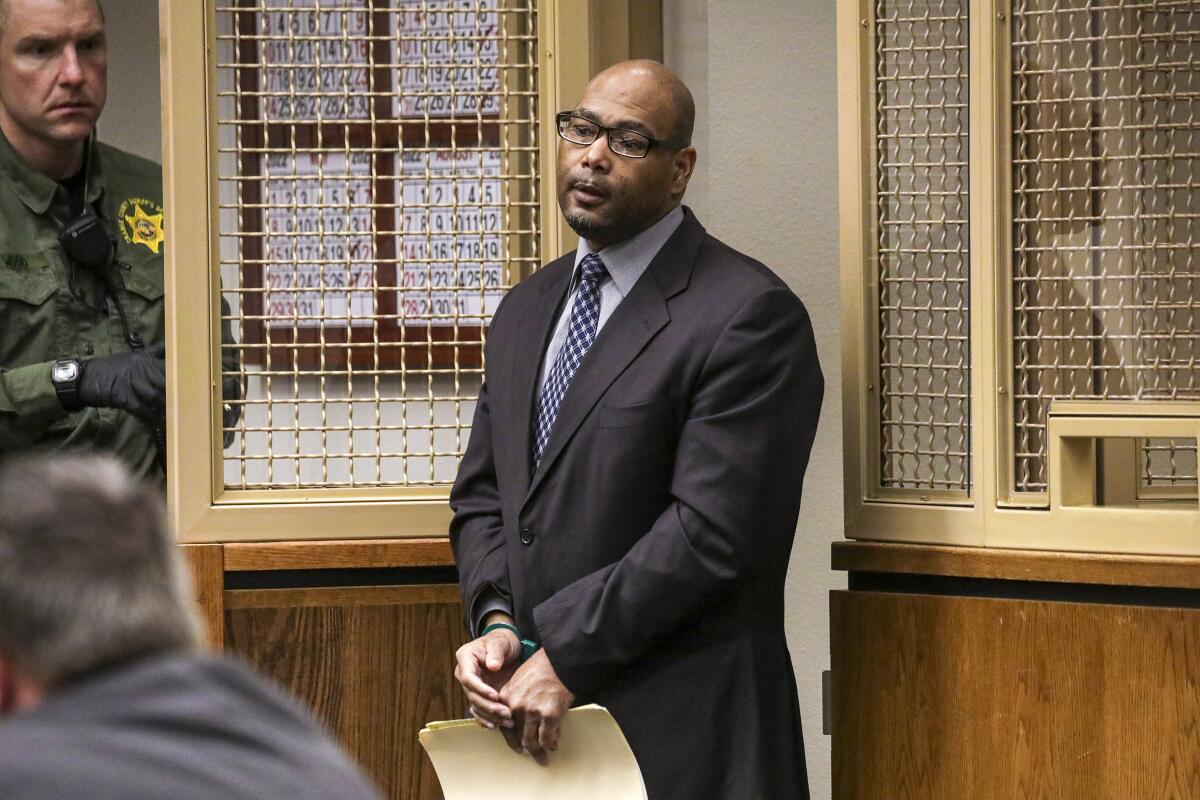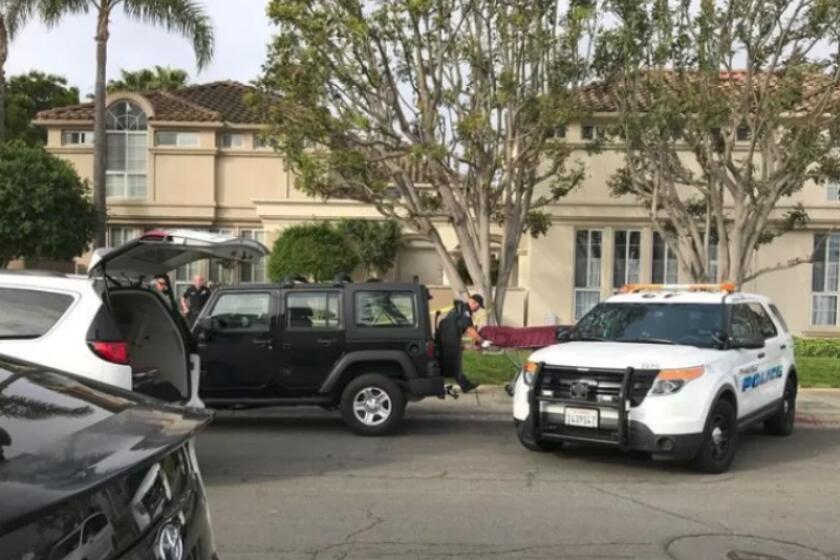O.C. district attorney violated Racial Justice Act in double murder case, judge finds

An Orange County Superior Court judge ruled Friday that Dist. Atty. Todd Spitzer violated the Racial Justice Act when he made comments about the dating habits of Black men while discussing a double murder case.
However, Judge Gregg Prickett stopped short of imposing any sanctions that would have reduced Jamon Buggsâ sentence. The appropriate remedy in the case â seeking life without the possibility of parole rather than the death penalty â had already been applied by the district attorneyâs office, Prickett said.
The Racial Justice Act, passed in 2020, prohibits prosecutors from seeking or obtaining a criminal conviction or imposing a sentence based on race, ethnicity or national origin.
âThe defendant has received what the statute would say was the appropriate remedy for the violation,â Prickett said. âThe court does not find that it would be in the interest of justice to dismiss enhancements, special circumstances or reduce charges.â
Buggs, who was convicted of murder in May for fatally shooting a man and woman inside a Newport Beach condominium, allegedly in a jealous rage, was sentenced by Prickett to life in prison without the possibility of parole.
âThe judge ruled that the defendant was treated fairly by Dist. Atty. Spitzer at every stage of the proceeding, from charging to conviction to the sentence of life without the possibility of parole for executing two innocent people in cold blood,â said Kimberly Edds, a spokeswoman for the district attorneyâs office.
Jamon Buggs, 47, was found guilty of gunning down Darren Partch and Wendi Miller in an execution-style killing.
During a roughly two-week trial, Buggsâ attorneys argued that he killed Darren Partch, 38, and Wendi Miller, 48, in the heat of passion, fueled by what they described as a toxic relationship between Buggs and his ex-girlfriend, Samantha Brewers.
In late February or early March 2019, Brewers and Partch met at a gym and exchanged Instagram usernames so they could keep in touch. The two were not dating, but Buggs became mistakenly convinced that they were a couple, Senior Deputy Dist. Atty. David Porter said.
Buggs later called Partch to tell him to stay away from Brewers. Partch agreed. But Buggsâ jealousy drew him to Partchâs apartment sometime after 1:45 a.m. April 20, armed with a .38-caliber handgun, Porter said.
While standing in the courtyard of the townhouse, Buggs apparently heard Partch and Miller being intimate in the upstairs bedroom and entered the townhouse through an unlocked door with his gun drawn. He shot Partch twice and Miller once.
Cambria Carpenter, Millerâs daughter, told Buggs during the hearing that because of his actions her mother didnât get to see her graduate high school. Carpenter said she will never be able to hug her mother, seek her advice or laugh with her again.
Buggs looked toward the podium at Carpenter and blinked rapidly as she spoke.
âEvery room that she once lit up is now dim because of you,â Carpenter said. âTo me youâre a monster ⦠and you have no value.â
Before he was sentenced, Buggs stood and apologized to Partchâs and Millerâs families, saying his emotions over his ex-girlfriend âtook controlâ of him before the killings.
âIâm sorry this happened. I stand accountable for what I did. I sinned and I ask for forgiveness,â he said.
The case had been mired in controversy since Spitzer made racist comments about the dating habits of Black men during an October staff meeting on whether to pursue the death penalty against Buggs.
At the meeting, Spitzer told prosecutors that he knows âmany Black people who get themselves out of their bad circumstances and bad situations by only dating white women,â according to a memo written by then-prosecutor Ebrahim Baytieh, who attended the meeting.
Spitzer has said allegations of âany racial animus or bias against the defendant are baseless and quite frankly offensive.â
Buggs is Black, while Buggsâ ex-girlfriend and Miller are both white. Spitzer has alleged that Baytieh wrote the memo in retaliation because Spitzer had initiated an investigation of him related to another murder case.
A judge is combing through several boxes of documents relating to Spitzerâs comments, raising the possibility that Jamon Buggsâ sentence could be downgraded if he is convicted.
In the months leading up to the sentencing hearing, Prickett combed through thousands of emails sent between members of the district attorneyâs office about the case to determine what materials, if any, should be provided to Buggsâ defense attorneys.
Late last month, Prickett turned over an unknown number of documents. The documents, which were filed under seal, have not been made public.
Prosecutors argued in court Friday that the defense failed to provide a preponderance of evidence that Spitzerâs comments negatively affected Buggsâ case.
Denise Gragg, one of Buggsâ defense attorneys, said Spitzerâs comments were an example of âthe oldest bias that existsâ regarding Black men and white women. She added that Spitzer has not acknowledged his comments as biased.
âIf you canât even recognize that is a bias, how can you assure yourself or us that there were not decisions made in this case or not made in this case that were influenced by that bias?â she asked.
âJustice is not just done from the jury box,â she added. âItâs done from the back halls; itâs done in chambersâ¦. That is the place where this case was damaged.â
More to Read
Sign up for Essential California
The most important California stories and recommendations in your inbox every morning.
You may occasionally receive promotional content from the Los Angeles Times.













